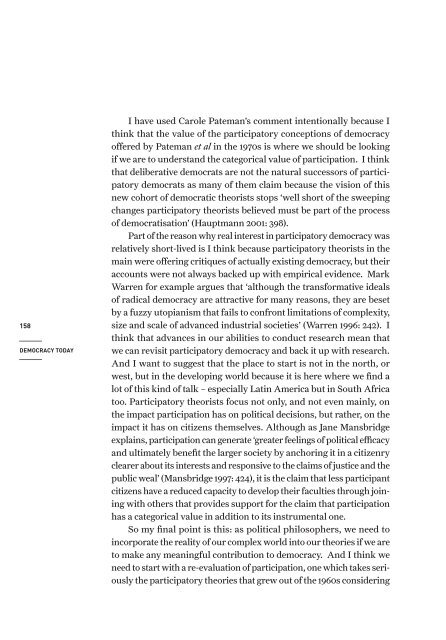Democracy Today.indb - Universidade do Minho
Democracy Today.indb - Universidade do Minho
Democracy Today.indb - Universidade do Minho
You also want an ePaper? Increase the reach of your titles
YUMPU automatically turns print PDFs into web optimized ePapers that Google loves.
158<br />
DEMOCRACY TODAY<br />
I have used Carole Pateman’s comment intentionally because I<br />
think that the value of the participatory conceptions of democracy<br />
offered by Pateman et al in the 1970s is where we should be looking<br />
if we are to understand the categorical value of participation. I think<br />
that deliberative democrats are not the natural successors of participatory<br />
democrats as many of them claim because the vision of this<br />
new cohort of democratic theorists stops ‘well short of the sweeping<br />
changes participatory theorists believed must be part of the process<br />
of democratisation’ (Hauptmann 2001: 398).<br />
Part of the reason why real interest in participatory democracy was<br />
relatively short-lived is I think because participatory theorists in the<br />
main were offering critiques of actually existing democracy, but their<br />
accounts were not always backed up with empirical evidence. Mark<br />
Warren for example argues that ‘although the transformative ideals<br />
of radical democracy are attractive for many reasons, they are beset<br />
by a fuzzy utopianism that fails to confront limitations of complexity,<br />
size and scale of advanced industrial societies’ (Warren 1996: 242). I<br />
think that advances in our abilities to conduct research mean that<br />
we can revisit participatory democracy and back it up with research.<br />
And I want to suggest that the place to start is not in the north, or<br />
west, but in the developing world because it is here where we find a<br />
lot of this kind of talk – especially Latin America but in South Africa<br />
too. Participatory theorists focus not only, and not even mainly, on<br />
the impact participation has on political decisions, but rather, on the<br />
impact it has on citizens themselves. Although as Jane Mansbridge<br />
explains, participation can generate ‘greater feelings of political efficacy<br />
and ultimately benefit the larger society by anchoring it in a citizenry<br />
clearer about its interests and responsive to the claims of justice and the<br />
public weal’ (Mansbridge 1997: 424), it is the claim that less participant<br />
citizens have a reduced capacity to develop their faculties through joining<br />
with others that provides support for the claim that participation<br />
has a categorical value in addition to its instrumental one.<br />
So my final point is this: as political philosophers, we need to<br />
incorporate the reality of our complex world into our theories if we are<br />
to make any meaningful contribution to democracy. And I think we<br />
need to start with a re-evaluation of participation, one which takes seriously<br />
the participatory theories that grew out of the 1960s considering
















